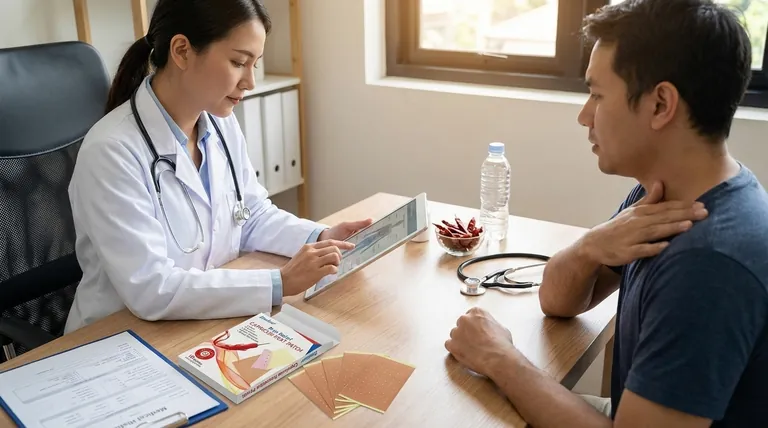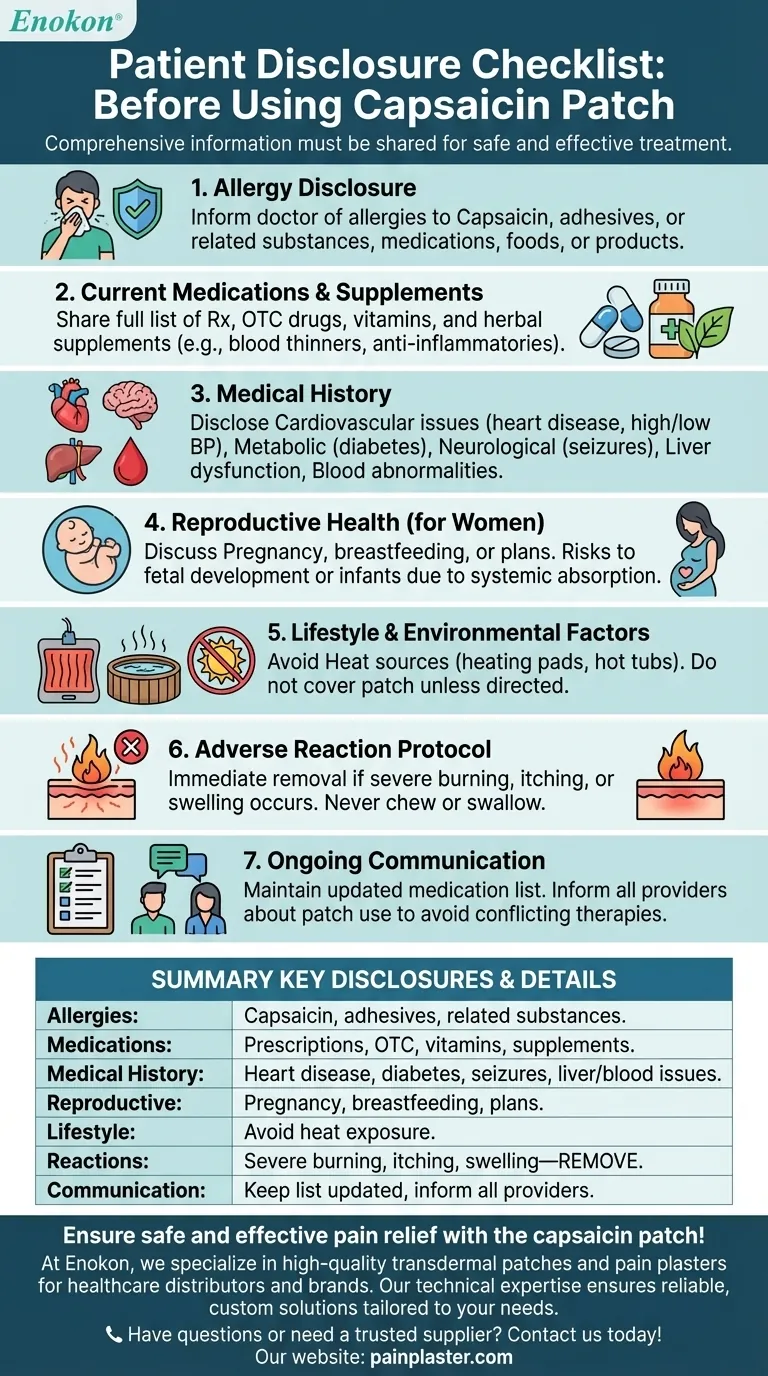Before using the Capsaicin Patch, patients must provide their doctor with comprehensive health information to ensure safe and effective treatment. Key disclosures include allergies, current medications, medical history, and specific conditions like heart problems or diabetes. Women should discuss reproductive health considerations, while all patients need to avoid heat exposure and monitor for adverse reactions. Maintaining a detailed medication list and communicating with all healthcare providers is crucial for coordinated care.

Key Points Explained:
-
Allergy Disclosure
- Patients must inform doctors about any known allergies to capsaicin, patch adhesives, or related substances. This includes allergies to medications, foods, or other products to prevent hypersensitivity reactions.
-
Current Medications & Supplements
- A full list of prescriptions, over-the-counter drugs, vitamins, and herbal supplements should be shared. For example, blood thinners or anti-inflammatory medications might interact with the patch, requiring dosage adjustments.
-
Medical History
- Critical conditions to disclose:
- Cardiovascular issues (e.g., heart disease, high/low blood pressure, stroke)
- Metabolic disorders (diabetes, high cholesterol)
- Neurological concerns (seizures, peripheral neuropathy)
- Liver dysfunction or blood cell abnormalities (low white blood cell count)
- Critical conditions to disclose:
-
Reproductive Health (for Women)
- Pregnancy, breastfeeding, or plans for pregnancy must be discussed. The patch’s systemic absorption could pose risks to fetal development or infants.
-
Lifestyle & Environmental Factors
- Avoid heat sources (heating pads, hot tubs) that may intensify skin reactions. Patients should also refrain from covering the patch unless directed by a doctor to prevent excessive absorption.
-
Adverse Reaction Protocol
- Immediate removal of the patch is necessary if severe burning, itching, or swelling occurs. Patients should never chew or swallow the patch due to toxicity risks.
-
Ongoing Communication
- Maintain an updated medication list for emergencies and inform all treating providers about patch use to avoid conflicting therapies. For instance, anesthesiologists need this information before surgeries.
By addressing these points, patients and doctors can collaboratively mitigate risks and optimize the therapeutic benefits of capsaicin patch therapy.
Summary Table:
| Key Disclosure | Details to Share |
|---|---|
| Allergies | Capsaicin, patch adhesives, or related substances. |
| Current Medications | Prescriptions, OTC drugs, vitamins, and herbal supplements. |
| Medical History | Heart disease, diabetes, seizures, liver issues, or blood disorders. |
| Reproductive Health | Pregnancy, breastfeeding, or plans for pregnancy. |
| Lifestyle Factors | Avoid heat exposure (heating pads, hot tubs). |
| Adverse Reactions | Severe burning, itching, or swelling—remove patch immediately. |
| Ongoing Communication | Keep an updated medication list and inform all healthcare providers about patch use. |
Ensure safe and effective pain relief with the capsaicin patch!
At Enokon, we specialize in high-quality transdermal patches and pain plasters for healthcare distributors and brands. Our technical expertise ensures reliable, custom solutions tailored to your needs.
📞 Have questions or need a trusted supplier? Contact us today to discuss your requirements!
Visual Guide

Related Products
- Capsaicin Chili Medicated Pain Relief Patches
- Heat Relief Capsicum Patch for Lower Back Pain Relief
- Asthma Cough and Pain Relief Patch for Adults and Kids
- Far Infrared Deep Heat Relief Patches Medicated Pain Relief Patches
- Menthol Gel Pain Relief Patch
People Also Ask
- Are pain relief patches safe for sensitive skin? Your Guide to Safe Use & Skin Testing
- What is the purpose of capsaicin patches? A Guide to Temporary Pain Relief
- Can children use the pain relief patch? A Critical Safety Guide for Parents
- How do you apply the Signal Relief patch to find the proper placement? A Step-by-Step Guide to Maximum Relief
- How do pain relief patches work? A Guide to Targeted, Long-Lasting Pain Relief















